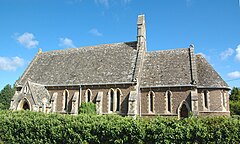Dry Sandford
| Dry Sandford | |
|---|---|
 St. Helen's parish church | |
Location within Oxfordshire | |
| OS grid reference | SP4600 |
| Civil parish | |
| District | |
| Shire county | |
| Region | |
| Country | England |
| Sovereign state | United Kingdom |
| Post town | Oxford |
| Postcode district | OX13 |
| Dialling code | 01865 |
| Police | Thames Valley |
| Fire | Oxfordshire |
| Ambulance | South Central |
| UK Parliament | |
| Website | Wootton and Dry Sandford |
Dry Sandford is a village in the Vale of White Horse district of England, about 3 miles (5 km) north-west of Abingdon. It is one of two villages in the civil parish of St Helen Without. It was part of Berkshire until the 1974 boundary changes transferred the Vale of White Horse to Oxfordshire.
Manor
[edit]The Domesday Book of 1086 records the place as Sandford.[1] The "sandy ford" must have been across the stream now known as Sandford Brook, a tributary of the River Ock, once known as the Lucringe.[2] The village became known as Dry Sandford by the 18th century.[1] Dry Sandford was a manor in the parish of St Helen's, Abingdon, and was held by Abingdon Abbey until the Dissolution in 1538.[1]
Parish church
[edit]The Church of England parish church of Saint Helen is a 13th-century-style Gothic Revival building designed by J.B. Clacy[3] of Reading[4] and built in 1855.[1][5] St. Helen's has lancet windows, a nave, chancel, rib-vaulted apse[3] and a bellcote on the gable above the chancel arch.[5] St. Helen's was made a separate ecclesiastical parish in 1867,[1] but was united in a single benefice with St. Peter's, Wootton in 2000.[6]
Amenities
[edit]
Dry Sandford Pit is a nature reserve just south of the village managed by the Berks, Bucks and Oxon Wildlife Trust.[7] The site is of geological importance for its exposure of Corallian beds, and is designated a Site of Special Scientific Interest.[8]
References
[edit]- ^ a b c d e Page & Ditchfield 1924, pp. 416–421.
- ^ Grundy, G.B. (1927–28). "Berkshire Charters" (PDF). Berks, Bucks and Oxon Archaeological Journal. 27: 198. Retrieved 10 July 2011.
- ^ a b Pevsner 1966, p. 130.
- ^ Brodie et al. 2001, p. 375.
- ^ a b Historic England (18 March 2003). "Church of St Helen, St Helen Without, Vale of White Horse, Oxfordshire (1368572)". National Heritage List for England. Retrieved 20 October 2011.
- ^ "The Parish Churches of The Villages of Wootton and Dry Sandford, Abingdon, Oxfordshire, UK". Wootton and Dry Sandford. The Benefice of Wootton and Dry Sandford. Archived from the original on 19 February 2012. Retrieved 20 October 2011.
- ^ "Dry Sandford Pit Nature Reserve". Reserves. Berks, Bucks and Oxon Wildlife Trust. 2011. Archived from the original on 27 September 2011. Retrieved 20 October 2011.
- ^ "Dry Sandford Pit (SSSI)". England's Geology. Natural England. Archived from the original on 27 March 2012. Retrieved 20 October 2011.
Sources
[edit]- Brodie, Antonia; Felstead, Alison; Franklin, Jonathan; Pinfield, Leslie; Oldfield, Jane, eds. (2001). Directory of British Architects 1834–1914, A–K. London & New York: Continuum. p. 375. ISBN 0-8264-5513-1.
- Page, W.H.; Ditchfield, P.H., eds. (1924). "St. Helen's". A History of the County of Berkshire, Volume 4. Victoria County History. London: Institute of Historical Research. pp. 416–421. Retrieved 10 July 2011.
- Pevsner, Nikolaus (1966). Berkshire. The Buildings of England. Harmondsworth: Penguin Books. p. 130.


